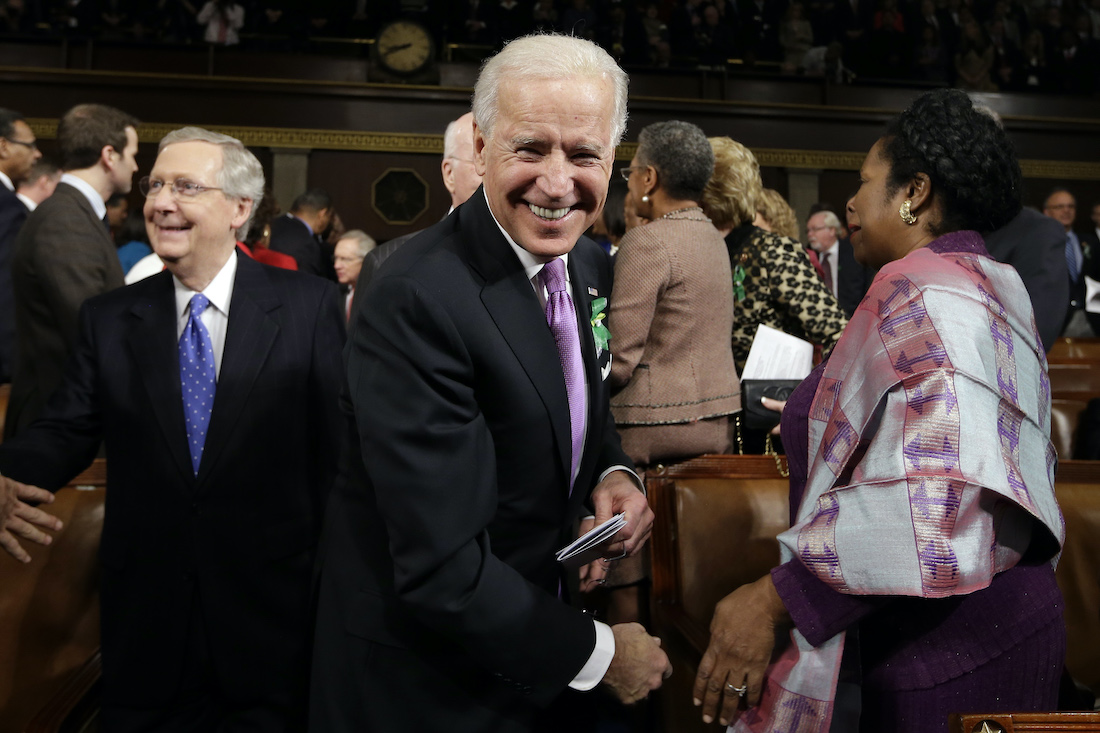The 2020 elections threw a wrench into the works of both parties. Republicans maintained power in state legislatures and in the U.S. Senate while losing the White House. Democrats did far worse than expected at all levels, including Joe Biden barely squeaking into the White House. The bad news is that this will result in some very bad executive policies, such as increased funding for abortion advocacy. The good news is that it will force both parties to either continue splitting the nation apart or find areas of political agreement.
Several good policies, which could be sources of mutual agreement, lie inside the massive federal budget. Both parties pretend to be fiscally conservative when in the opposition, then throw off the veil when in power. However, 2021 offers voters the chance to pressure Biden, Senate Majority Leader Mitch McConnell, and House Speaker Nancy Pelosi to crack down on the corruption, incompetence, and inefficiency that cost U.S. taxpayers more than $400 billion annually – enough to buy each American a new iPhone, with money left over.
A good place to start is the F-35 engine program, which is a financial boondoggle. Its supporters boast of its alleged next-generation military capabilities and tout its trillion-dollar long-term cost as a success; however, these so-called “savings” come not from cutting costs, but from spending less than projected. That would be like expecting to spend $60,000 on household expenses, then realizing you are going to spend $50,000, and claiming $10,000 as a “savings.”
Jonathan Bydlak of R Street laid out the full case against the F-35 earlier this year, shortly after the Pentagon opened an investigation into the program’s finances. But then things got worse, thanks to administrative incompetence. Several Democrats in Congress opened an investigation, because the program spent $300 million on defective or missing parts, and another report showed the program will cost $10 billion more than the Pentagon’s previous five-year projections – even as the engine’s developers are still fixing serious design flaws.
Corporate subsidies are another area of potential bipartisan agreement, both in Washington and among both parties’ grassroots. Here are some of the subsidies that richly deserve to be cut:
- Washington saw fit to grant tens of billions of dollars in taxpayers’ money to the airline industry and Boeing this year because of the coronavirus pandemic;
- The Export-Import Bank gave nearly $3 billion, mostly to large corporations for overseas work in 2019;
- Tens of billions of dollars are spent each year on inefficient renewable energy subsidies;
- A Cato Institute report found that 85% of farms that received $25 billion in subsidies in 2014 earned over $134,000. But the annual tradition of sending tax dollars to farms has been exacerbated by President Donald Trump’s efforts to offset his trade war with China. Those subsidies alone have totaled $28 billion; and
- All of these subsidies pale next to the hundreds of billions in bailouts given to financial companies in 2008.
With both parties jockeying for the populist vote, they can easily gain support by eliminating subsidies – though that would risk their ability to collect lobbyists’ money for their re-election campaigns. Pushing Biden and Congress in the right direction on subsidies would take a focused campaign by voters across the political spectrum.
Even that gargantuan undertaking would require less effort than reforming Medicaid and Medicare. They are among the most sieve-like programs in the federal government, losing more than $200 billion each year to fraud and improper payments. The good news is that this acts as yet another argument against government-controlled healthcare; the bad news is that the programs have not become more financially accountable over the years. The worse news is that Sen. James Lankford, R-OK, told me in 2016 that anti-fraud efforts are completely inadequate to prevent significant losses of taxpayer money.
Berwick and the Rand Corporation estimated fraud at $98 billion – about 10% of the total costs of the programs that year. If that percentage holds true for 2020, the total amount lost to fraud is over $130 billion out of over $1.3 trillion spent. In just the last month, a doctor in New Jersey has been charged with $24.6 million in fraud, and last month, an addiction center was charged with making millions of dollars in fraudulent charges.
One of the major problems with preventing fraud is that it costs a tremendous amount of money to prevent fraud or return defrauded money to taxpayers. A 2014 Congressional Budget Office (CBO) report found that the costs of such efforts exceed $1.4 billion annually, while federal prosecutors clawed back only $26 billion between 1997 and 2013. That sounds like a lot, except when contrasted with the $98 billion that the Berwick/Rand study found was lost annually. The CBO projected that dollars spent on fraud prevention would result in a 50% above-cost return to taxpayers and that efforts to crack down on present fraud would deter future fraud – but the amount of fraud far outweighs the benefits to taxpayers.
Aside from fraud, improper payments officially totaled $175 billion in 2019. As I laid out in March, however, the real number is likely far higher. And out of that $175 billion, Medicare and Medicaid programs were responsible for more than $100 billion payments made out of simple human error. Medicaid and CHIP lost nearly 15% of their respective budgets to these errors in 2019.
That’s right: The federal government allowed $100 billion of taxpayers’ dollars to slip through the cracks of Medicaid and Medicare in addition to overt fraud. While the programs, especially Medicaid, have become more transparent over time, they still lack financial controls which Congress and the executive branch must implement.
Then, there are simple inefficiencies. One of the late Sen. Tom Coburn’s legacies is the annual Government Accountability Office report on duplication, fragmentation, and overlap in the federal government. This report provides scores of examples each year – nearly 1,000 examples over the last decade – of ways that the federal government’s inefficiency and poor use of taxpayer money pervades agencies and programs. As two former Coburn staffers noted in The Hill earlier this year, “GAO has identified massive amounts of duplication in federal programs, including 15 programs on financial literacy, 160 federal housing assistance programs, 94 green building programs, 253 crime prevention programs, 14 diesel emission reduction programs, and 209 STEM education programs.”
While there is no official estimate of dollars lost each year due to duplication – the GAO simply calculates the sum at “tens of billions” of dollars annually – the agency does estimate that out of “more than 325 areas and more than 900 actions”:
Congress and executive branch agencies have partially or fully addressed 721 (79 percent) of the actions we identified from 2011 to 2019, resulting in about $429 billion in financial benefits. We estimate tens of billions more dollars could be saved by fully implementing our open actions.
GAO Director of Strategic Issues Jessica Lucas-Judy told me about a particularly egregious example of negligence with taxpayers’ dollars:
We examined every class of ships recently built and found 150 examples of systemic maintenance problems, such as failed engines and non-functional plumbing, that would cost the Navy $4.2 billion to correct. Many of these problems could have been prevented with some attention to future maintenance concerns when designing and building the ships. We also found that the Navy underestimated the costs to maintain some ships by $130 billion. In March 2020, we made 11 recommendations to help the Navy focus on maintenance earlier and one suggestion to Congress to enhance oversight.
The 2020 report further outlines that just 57% of its recommendations have been fully implemented. This means that despite nine years of preparation time, federal lawmakers and administrators have not seen fit to assure that taxpayer money isn’t being wasted by a federal bureaucracy too large and too cumbersome to ever be respectful of taxpayers’ dollars.
Voters love to blame politicians for government spending. However, this problem exists, because we fail to hold elected officials accountable. The Departments of Defense and Veterans Affairs would spend less money if we went to war less often and conducted wars more efficiently – but we do not make politicians care about these goals. Medicaid and Medicare lost enough money last year to pay for a used iPhone for each American … but we don’t blink an eye. And the federal government continues to take money out of our pockets and to line those of criminals, incompetent federal employees, and corporate leaders.
It is time for a change. Can the parties put aside their politicking long enough to stop at least the most stupid and wasteful form of spending? That is what would be required of wise and faithful stewards.

